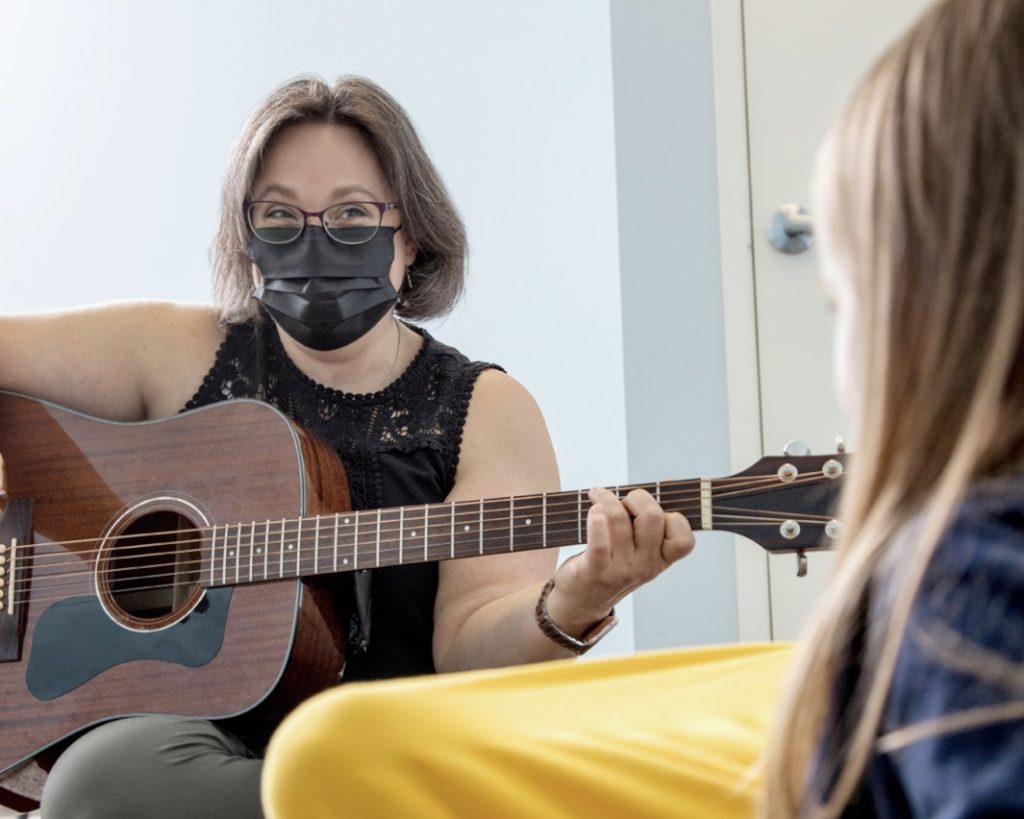Why Music Therapists ARE Essential

The pandemic has been challenging for everyone and music therapists are no exception. Many of us have been sidelined because we haven’t been deemed essential. This is most likely because those making decisions don’t understand what we do or are unaware that we even exist in the healthcare community. Here are 3 reasons why music therapists are essential.
We Are Therapists
Every music therapist, has experienced being minimized at some point in their career. Well intentioned but uninformed individuals will label us “music lady”, “entertainer”, “singer”. It makes our hearts sing (yes, pun intended) when we are correctly labelled as a “therapist”. These misconceptions often lead to us, and our work being lumped in with entertainers. Because we sing and play the piano and guitar, that is the easiest box to put us in.
Yet the work we do is so much more than a sing-a-long. I like to say that all music can be therapeutic but all music is not music therapy. It takes a qualified MTA (certified music therapist) to support a client and use music purposefully to maximize its benefit. Although the work we do can look the same as entertainment on the surface, there is so much more going on. We use our craft to address the mental health, developmental and rehabilitative goals of our clients. You can read more about how music therapy is different than entertainment in my previous blog Music Therapy: 5 Questions Answered!.
Music Therapists Support Mental Health
During this pandemic, it has been excruciating watching the need for mental health support reach an all-time high. This was especially true in the long-term care homes where we work. Music therapy is a treatment based support for senior’s mental health. Yet, we weren’t allowed into facilities to do our job. because we weren’t “essential”. Music therapists everywhere did a happy dance when we were finally allowed back into our homes to provide our essential service and support our clients.
However, we also support mental health in children and youth, people with intellectual or developmental disabilities, and those who seek an alternative to traditional talk therapy. Even when the work we do is looking at development or rehabilitation, there are always undercurrents and a focus on mental health. You can feel music. It is an ideal treatment for passive or non-verbal client’s. How many times during this pandemic did you put on your favourite song to make yourself feel better? Well music therapists bring our client’s music to them. Many of whom are unable to put on their favourite song themselves.
Music Therapists Support The Team
Music therapists are a chameleon of therapies. The musical medium lends itself to support all our allied therapists. We often consult and work along-side Speech-Language Pathologists, Physiotherapists & Occupational Therapists. Music has a unique and magical was of stimulating all kinds of parts of the brain. We use our speech/communication when we sing or vocalize with songs. We use our physical/motor movements when we play instruments or dance/move with music. And we can practice ADLs with the use of nemonic songs and support sensory needs in a musical environment.
The wonderful thing about music therapy is that we are able to address practically any goal in a musical way. Want to learn how to tie a show, we will write a song including the steps. How about working on annunciating more clearly, we will pick songs (or write ones) that focus on the sounds you are struggling with. Or maybe improve your range of motion, we will play with instruments. Music therapy can do it all. We work closely with our allied therapists to support the assessments and treatment plans they put in place. And, music is so fun that our clients often forget that they are working hard.
Bonus Reason – We Make Everyone Feel Better
Everyone loves music (or at least almost everyone). Bystanders or those who overhear our sessions frequently report feeling better after hearing not only the music, but the joy our client exudes while participating in the music. One of my favourite things is to work in my office while listening to a mostly non-verbal client belt our their favourite Disney song. PSWs report that the mood on their unit improves on music therapy day. The benefit of music therapy extends beyond the session itself.
Bob Marley’s son Ziggy said, “Music is one of the most essential things in life.” and we most certainly agree. We would add that music therapists are the essential health care professional that brings this essential music to our clients.
By Heidi Flynn, RP, MTA
